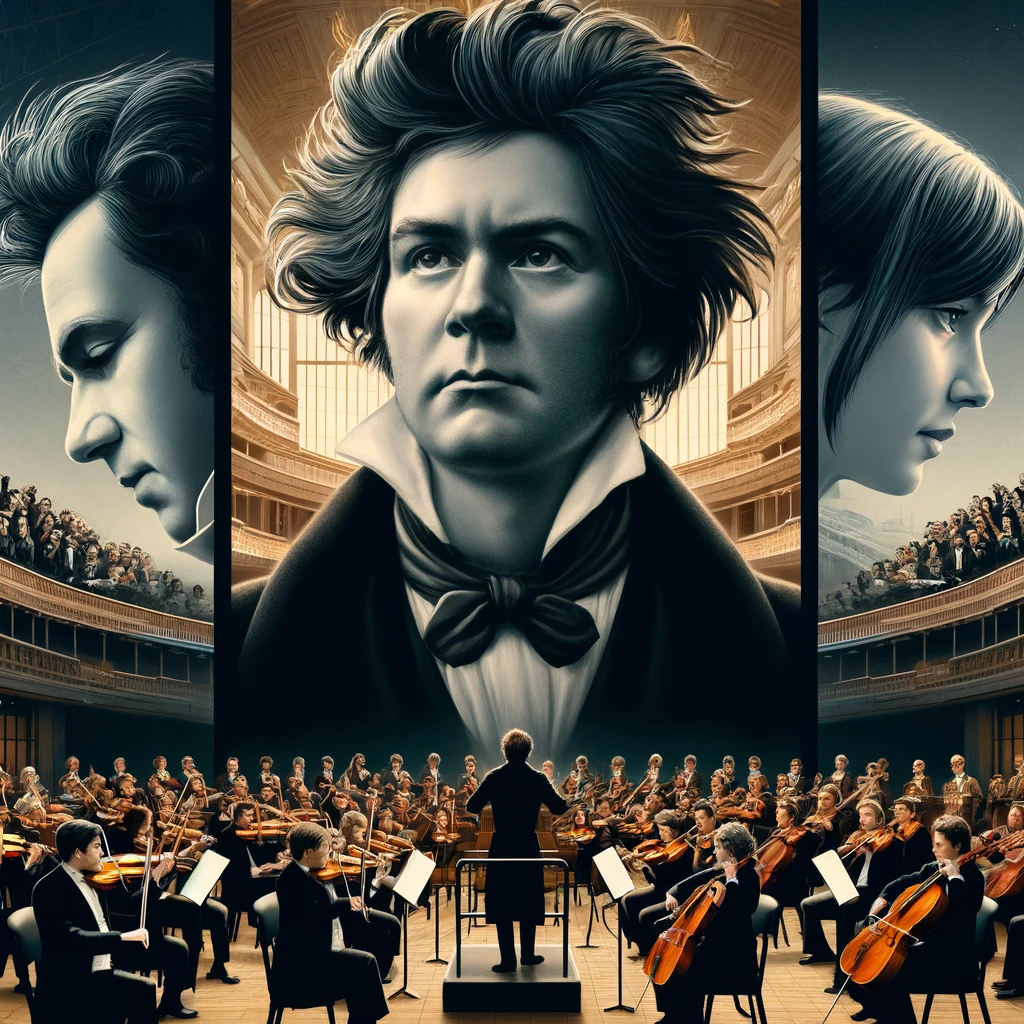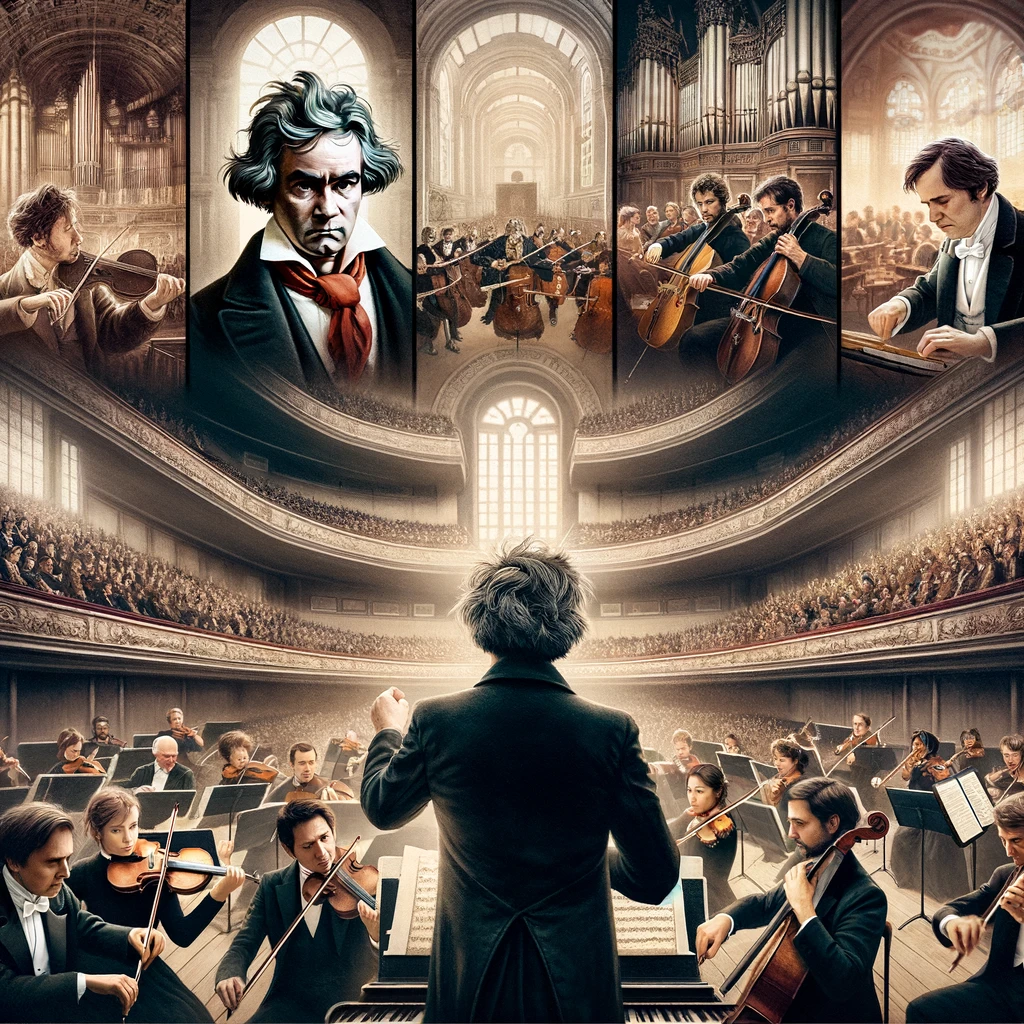
Beethoven’s Influence on Global Classical Music
Ludwig van Beethoven, a towering figure in classical music, has left an indelible mark on the world of music that transcends time and geography. His compositions are not just artifacts of the era in which they were created but are living, breathing entities that continue to evolve through classical performances around the globe. This exploration traces how Beethoven’s music has influenced classical performance across different cultures and how performers today continue to reinterpret his works.
The Foundations of Beethoven’s Global Influence
Beethoven’s compositions came at a time of profound change in Europe, both socially and politically. His music, characterized by its emotional depth and complex structures, challenged the conventions of his time and paved the way for the Romantic period that followed. The lasting appeal of his music can be attributed to its universal themes—struggle, triumph, and human emotion—which resonate with audiences worldwide.
Beethoven’s ability to convey profound emotion through his symphonies, sonatas, and quartets has made his music a staple in the repertoires of classical musicians across the globe. From the powerful openings of Symphony No. 5 to the introspective beauty of the Moonlight Sonata, his works engage both the performers and their audiences in a deeply personal way.
Beethoven’s Music Through the Ages
In the 19th century, Beethoven’s music was a symbol of artistic freedom and expression. Performers of the time, like Franz Liszt and Clara Schumann, interpreted his music with a personal touch that often included significant tempo changes and dynamic contrasts, mirroring the emotional intensity of the era. These interpretations helped cement Beethoven’s reputation across Europe and later, the world.
As the 20th century approached, a shift towards historical accuracy in musical performance emerged. Musicians and scholars began to seek out original manuscripts and early editions of Beethoven’s works to faithfully recreate the composer’s intentions. This movement, known as the historically informed performance practice, gained momentum in the late 20th century and has significantly influenced how Beethoven’s music is performed today.
Beethoven in Different Cultural Contexts
Beethoven’s global influence is evident in the way his music has been embraced by diverse cultures. In Japan, for example, Beethoven’s Ninth Symphony has become a staple during the New Year’s celebrations, symbolizing hope and unity. Similarly, in the United States, his music has been a powerful symbol in the civil rights movement, with performances of his symphonies serving as acts of cultural and political statement.
In Europe, annual festivals dedicated to Beethoven, such as the Beethovenfest in Bonn, Germany, his birthplace, continue to draw crowds from around the world. These festivals not only celebrate his music but also encourage new interpretations and compositions inspired by his works.
Modern Interpretations and Innovations
Today’s performers bring a wide array of perspectives to Beethoven’s music, influenced by advancements in instrument technology and a global exchange of interpretative ideas. Modern orchestras, equipped with a better understanding of Beethoven’s original scoring and period instruments, strive to blend historical techniques with contemporary sensibilities, creating performances that are both authentic and innovative.
Moreover, technology has allowed for Beethoven’s music to be explored in new formats. Digital performances and recordings make it possible for audiences worldwide to experience his compositions in high definition, bringing the nuances of live performances to the digital space.
The Impact on Modern Composers and Educators
Beethoven’s influence extends beyond performances and into the realm of education and composition. Music educators around the world use his compositions as foundational teaching tools, illustrating concepts of form, harmony, and orchestration. Furthermore, contemporary composers often cite Beethoven as a major influence, drawing on his innovative methods and thematic development techniques to inform their own music.
Ludwig van Beethoven’s music has not only stood the test of time but has also grown and adapted through centuries of performances across the globe. Each interpretation and performance adds a new layer to our understanding of his genius, ensuring that his influence on the world of classical music is both enduring and dynamic. As new generations of performers and audiences discover his works, Beethoven’s legacy continues to evolve, promising a never-ending dialogue between the past and the present in the realm of classical music.

Beethoven’s Influence on Performance Techniques
One of the most significant impacts Beethoven has had on global classical music performance relates to the evolution of playing techniques. His music, often demanding in terms of emotional expressiveness and technical proficiency, has pushed musicians to develop new techniques to meet these challenges. For instance, his later piano sonatas, with their wide dynamic ranges and complex fingerings, spurred developments in piano construction and playing technique that are still influential today.
The Role of Conductors in Interpreting Beethoven
Conductors have played a crucial role in shaping the interpretation of Beethoven’s works over the years. The nuances of tempo, dynamics, and articulation that Beethoven meticulously noted in his scores make his music a fertile ground for conductors to explore different interpretative approaches. Great conductors like Arturo Toscanini, Leonard Bernstein, and more recently, Simon Rattle, have each brought their unique perspectives to Beethoven’s symphonies, influencing how these works are perceived and performed around the world.
Bernstein, in particular, was known for his emotionally charged performances of Beethoven, which often included broader tempos and a heightened contrast between loud and soft passages. His interpretations brought a new level of drama and expressiveness to Beethoven’s compositions, which resonated with audiences globally and influenced a generation of conductors.
Beethoven’s Music in Film and Media
Beethoven’s music has transcended concert halls to become a staple in films, television, and online media, further broadening its influence. His symphonies and sonatas often provide the emotional weight needed in critical scenes, enhancing the narrative and connecting with audiences in a direct and powerful way. The iconic use of the Ninth Symphony in Stanley Kubrick’s “A Clockwork Orange” and the Seventh Symphony in “The King’s Speech” are just two examples of how Beethoven’s music continues to be relevant in modern media, influencing how his music is perceived and understood by a global audience.
Educational Impact and Accessibility
Beethoven’s music has also played a significant role in music education, serving as essential material in teaching the fundamentals of music theory and composition. His works are used to demonstrate a range of music concepts, from basic rhythmic patterns to complex structures like sonata form and thematic development. Additionally, the global availability of Beethoven’s scores and recordings has made his music accessible to students and enthusiasts from all backgrounds, promoting a democratic approach to classical music education.
Beethoven’s Enduring Legacy
The enduring appeal of Beethoven’s music lies in its ability to speak to the universal human experience. His compositions, with their depth of emotion and structural complexity, continue to inspire performers and audiences alike. As we move further into the 21st century, the ways in which Beethoven’s music is interpreted and performed will continue to evolve, influenced by cultural exchanges and technological advancements. Yet, at its core, the music remains a profound expression of the human spirit that resonates across cultural and temporal boundaries.
Beethoven’s influence on the global stage is a testament to his genius and the universality of his music. Whether through live performances, educational use, or media adaptations, his work continues to reach new audiences, ensuring that his legacy not only endures but thrives. Through the ongoing evolution of performance practices and interpretations, Beethoven’s music remains vibrant and relevant, a cornerstone of classical music that continues to inspire and move people around the world.